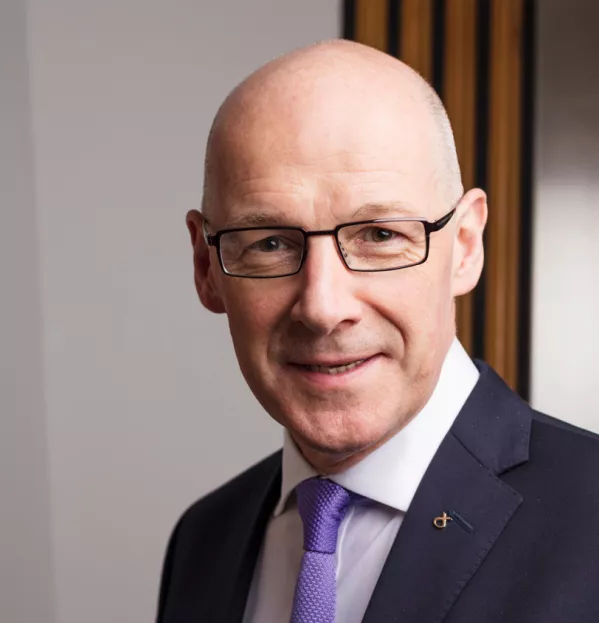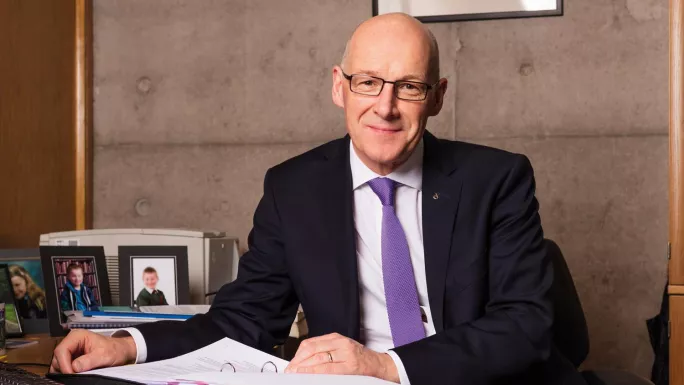‘I saw the impact of poverty when I was a schoolboy’

Education secretary John Swinney was belted twice in secondary school for “trivial misdemeanours”.
“It wouldn’t surprise me if it was for talking when we’d been told to stop talking,” says Swinney, who is similarly loquacious on the day of our interview.
This personal memory of corporal punishment fits with a theme in our discussion: how much education has changed for the better since the 1970s.
Swinney was part of an S1 cohort of 120 when he started at Edinburgh’s Forrester High School; by the time he got to S6, only eight remained, as the system had shed those who were not deemed “academic”. As he said in a major speech on education last month, “poverty and inequality determined their future”.
School politics
His time at a comprehensive school “undoubtedly” drove his political convictions, he says, as he saw this supposedly egalitarian system falling a long way short. “I realised quite abruptly, quite early when I went to secondary school, that other young people had much greater challenges to overcome than I had - and that’s never left me, and it’s shaped a lot of my views and my attitudes,” he says.
So if you ask Swinney about the SNP’s achievements in education after a decade in power, he points to far more teens from poor communities getting one or more Highers, and rising numbers in “positive destinations”. He is, however, careful to acknowledge that an “attainment gap” still blights Scottish education.
Swinney’s parents were “not political people” and would never say how they voted. There was one exception: his father voted against Brexit last June, explaining that if you grew up in the Second World War “wondering if your house was going to be bombed” each night, the European project represented hope of such scenarios never being repeated.
Swinney joined the SNP aged 15, shortly after the 1979 devolution referendum left him with “a profound sense of disappointment”. (In 2014, similarly, there would be a surge of disappointed young Yes voters joining after the independence referendum.)
Most voters in 1979 had wanted a Scottish assembly, but the idea was not taken forward because of a controversial legal amendment that stated a simple majority was not enough - 40 per cent of the electorate had to be in favour. The referendum was discussed frequently in schools, he recalls, in and out of classrooms, amid “a great sense of anticipation and excitement that Scotland had the opportunity to change the direction of our country”.
A recent BBC television documentary series on the history of childhood in Scotland left Swinney gaping “almost in disbelief” at how much schools had changed, particularly when it highlighted the devastating impact that corporal punishment had on some children.
“I think the journey that Scottish education has taken in the course of my lifetime has been absolutely remarkable,” says Swinney. He recalls the fuss that his family made as he prepared a show-and-tell in P7 “because it was such a seminal moment in the Swinney household”. Now, even P2 pupils, such as his son, see no big deal: “My son’s up on his feet in front of his class almost every day of the week.”
Similarly, as a parent, he is struck by how keen his son’s school is to get him involved in learning. “Other than for a parents’ night or school show, my mother would never have darkened the door of the school,” he says.
Swinney had a four-year spell as SNP leader, between Alex Salmond’s two periods in charge, when the party struggled to make an impression. But his political reputation was defined by nine years as finance secretary. While not entirely avoiding controversy, he was widely viewed as a steady pair of hands and, after the drift of Angela Constance’s time heading up education, it was no huge surprise when first minister Nicola Sturgeon appointed one of her big-hitters to the role in May 2016.
Days later, he was grappling with disappointing results in the annual Scottish Survey of Literacy and Numeracy (SSLN), which called into question the government’s insistence that education was its No 1 priority. Behind the scenes, key figures in Scottish education initially seemed reassured that Swinney was keen to meet them and act on their concerns.

‘Challenging’ job
By August, he had already moved to address teachers’ confusion over Curriculum for Excellence, with the publication of simplified guidance and the announcement of a host of benchmarks; the next month he was scrapping the unit assessments that teaching unions said were driving up teacher workload unnecessarily. He has, however, notably resisted calls to scrap standardised national assessments - which are “on schedule” to start in 2017-18 - as, alongside the benchmarks, he insists these will “assist in informing teacher judgement” about what works in the classroom.
However, some now wonder whether Swinney’s interventions were properly thought through. The Scottish Qualifications Authority’s planned changes to National 5 once unit assessments go, for example, were widely criticised for putting pupils at risk of leaving school without qualifications. Just two weeks ago, Swinney sought to mop up this mess with new interim guidance promising a safety net for those who fall short at National 5.
Swinney admits that finance and education are very different, and he has been surprised by “the scale and range of topics” in a brief that spans the journey from nursery to university.
“The principal thing is that the choices that you have to make in education, I think, are more contested,” he says. In finance, “a certain amount of money is spent” and there are clear parameters. In contrast, in education, “there are a number of options … that would be equally valid - there isn’t an absolute certainty that, ‘You must do this, that’s the right thing to do.’” And, Swinney says, “That provides a bit more challenge.”
But he vigorously defends his early record. Last August’s CfE guidelines have received “unreserved positive feedback” in his many conversations with teachers, whether during official visits or chance encounters. On the benchmarks, he rejects claims that these merely add more boxes for teachers to tick: they are “designed to give absolute clarity to the teaching profession”. He adds: “I think anyone looking at the guidance that goes with the benchmarks is empowered to say, ‘This ain’t no tick-box exercise.’”
In Swinney’s set-piece speech at Queen Margaret University, in Musselburgh, last month, amid all the conciliatory platitudes one expects from ministers, there was a short but striking section in which he decried a resistance to change within Scottish education. There was a distinct echo of the stridency deployed by Michael Gove, the former Westminster education secretary who revelled in confrontation with teachers.
“And what is perhaps most worrying is that this body of opinion is from within Scottish education,” said Swinney, before adding that, with data such as SSLN’s showing clear failings, “Change is needed, change is happening and more change is coming.”
Details will emerge in June, when, having waited for May’s council elections to pass, the government will publish its long-awaited response to the Education Governance Review. Swinney wants to give more powers to headteachers while councils “retain their democratic responsibility for education at local level”.
In trying to square that circle, he risks alienating everyone: primary school leaders’ body AHDS has questioned whether there is much appetite for more autonomy; while the Hometown Foundation, which wants to help schools opt out of council control, has grown tired of waiting for government feedback and earlier this month peevishly tweeted that: “It’s becoming increasingly obvious that the SNP have not made education their #1 priority.”
Swinney insists that education is “my absolute priority”, even as another independence referendum comes into view. On that other constitutional elephant, Brexit, he fears that less freedom of movement will result in Scotland’s population falling again, leaving classrooms less vibrant. “A good proportion of the young people in my son’s class are from families with Eastern European origin - and it’s a tremendous experience of interaction,” he says.
When Swinney opened new premises for his old school in 2010, another guest was his former headteacher, who struggled to remember the well-behaved young John, because, he said: “I have absolutely no recollection of you darkening my door at school.”
But none of the current crop of around 2,500 headteachers are going to forget John Swinney - his announcement in June may radically change the landscape of Scottish education.
You need a Tes subscription to read this article
Subscribe now to read this article and get other subscriber-only content:
- Unlimited access to all Tes magazine content
- Exclusive subscriber-only stories
- Award-winning email newsletters
Already a subscriber? Log in
You need a subscription to read this article
Subscribe now to read this article and get other subscriber-only content, including:
- Unlimited access to all Tes magazine content
- Exclusive subscriber-only stories
- Award-winning email newsletters